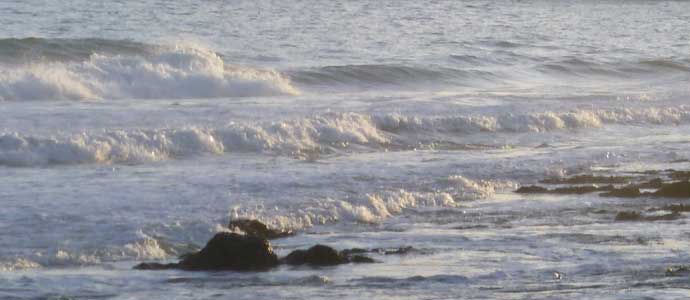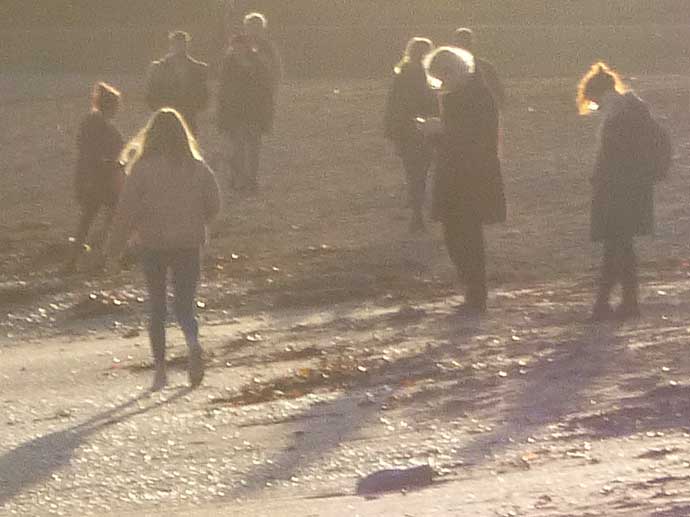I could believe that the radio has got this right. The sea is just slightly choppy, and covered all over with swirly shapes that look brighter in the sun - cleaner, even - than the water around them. They’re oil residues from passing boats’ engines, of course, but they’re beautiful, as though they were drawn freehand by an artist in an expansive mood. “This is the Om sign,” I imagine him saying. A moment ago, conveniently for this post, they swirled round into the shape of a skull - but I wasn’t quick enough to get the picture (see below).
This last week, three friends and a family member have told me that they’ve cancelled their Facebook accounts, and another friend has told me that she only visits hers because of her business. That big magnolia up on Trescobeas Road has flowered, and my roses have woken up. Oh, and by the playground in Kimberley Park, the ground is purple with crocuses**. “The times they are a-changin’,” as Bob Dylan put it back in 1964, and now Wikipedia tells me that he updated the song in 2018. “Lift up your voices and put down your phones, for the times they are a-changin’,” he sings on YouTube.
The weather’s changing, and so are we. I wonder how much of today’s technology will survive, once it’s no longer new and exciting. Once we’re bored by it, or disillusioned. Only the truly useful tools, I suppose. [Digression. I’ve mentioned Clean Ocean Sailing before. They’re collecting sacks and SACKS of discarded plastic on their trip round the Isles of Scilly. You can find them on Facebook, which in my opinion qualifies it as useful.] The phones are always going to be useful, I suppose, but so are the apps limiting our online/social-media time.
Last night we had a conversation about the nuisance of frequent upgrades, and when I got home I spent a happy few minutes tracking down the “unsubscribe now” button on a variety of emails that I usually just delete. Then I stood in the doorway looking up at the stars in the clear blue-black (slightly yellow at the edges, with artificial light) sky. The nights are still reassuringly cold at the moment. LinkedIn sent me another “suggested connection” to review, and Facebook sent me another message. “People visiting William Essex haven’t heard from you in a while. Write a post.”
I don’t think that many people visit William Essex on Facebook - those messages are about the “author page” I set up a while ago, in a fit of wild ambition, and then forgot - but people visiting William Essex off Facebook turn up quite regularly. Here. In the house. Or, as last night, I go to them. I went round to visit a couple of my friends last night, in their flat, and if we want to put this into Facebook-speak, they heard from me. I heard from them too. Facebook, try looking for me in real life.
But I’m not writing about social media today; I’m writing about the times, and change. Hottest February day on record. People leaving Facebook. After noticing that my tulips were coming up already, a bit more than a week ago, and after reading a short piece in an out-of-date newspaper about vineyards harvesting their grapes earlier every year (August now; used to be October), I went down finally to the Falmouth Bookseller and ordered myself a copy of Rachel Carson’s Silent Spring (1962). Been meaning to do that for a long time.
I ordered it partly because of the reference you’ll find here, in the post under the picture, and partly because I’ve been thinking about Falmouth’s brief ski season last year (students tobogganing on Trelawney Road, etc.). That happened a year ago this weekend - and boy, the drama. Inch or two of snow, transport disrupted, widespread panic, supermarket shelves empty - much amusement in countries where snow is just snow. Two days later, the snow disappeared. And then my tulips didn’t come up. And I remember conversations about shortages of locally grown vegetables that had been hit by the snow.
It’s human nature to predict catastrophe rather than mild inconvenience, and I realise that freak weather hitting local vegetables doesn’t amount to the catastrophe Rachel Carson had in mind. But I’ve also read that book by Malcolm Gladwell, and I’m familiar with the term “tipping point”. The weather’s weird. There seems to be general agreement that we’ve spent the last century or so making it weird. One of the themes of Silent Spring is that nature has ways of restoring its own balance. Too many of the wrong kind of insect, for example, and all of a sudden there are too many things that like eating the wrong kind of insect.
Or the wrong kind of insect develops a smartphone addiction and forgets to eat - sorry. Or the weather changes to wipe out populations of - nah. We’re too clever for that. We’d just Harness The Power Of Modern Technology and fix it. Wouldn’t we? We’re the wise and clever future of all the sci-fi that was ever produced in the golden age***. Aren’t we? Assuming I’ve still got your attention, let’s get to the point of this post, which is best reached via a reading of Rachel Carson’s book. Silent Spring describes the destruction of wildlife in the 1950s and early 1960s through the indiscriminate use of pesticides - the poisoning of insects, birds, animals, people and generations - we store pesticides and other poisons in our bodies, and pass them on to our children. You can’t be slightly pregnant, but we have been slightly poisoned.
My Penguin Modern Classics edition of Silent Spring includes an introduction, a preface and an afterword. It puts the blanket poisoning - spraying, from aircraft - of cities, towns, farmland, nature in the early sixties in its historical context. There were secret atomic-bomb tests being carried out; there was the cold war; Berlin Wall going up; Bay of Pigs; President Kennedy assassinated; Vietnam War; napalm and Agent Orange; widespread civil unrest, race riots and a policy adopted by the two nuclear super-powers of Mutually Assured Destruction. That acronym caught the spirit of the times.
Our parents and grandparents - and we - were being poisoned - without consultation - and in secret tests, radiation was being spread into the atmosphere. I’m pretty sure I’m not old enough to qualify as a Baby Boomer, and I can’t be bothered to check, but I was alive back then. I guess the Baby Boomers were not only alive but old enough to watch the news while they ate their DDT-saturated greens. Napalm. Riots. Moon landings. Watergate. Agribusiness spent a lot of money and time, I read here, on its efforts to discredit Rachel Carson - she was “an hysterical woman” and “a fanatic defender of the cult of the balance of nature”. Silent Spring is “now regarded as one of the most influential books of the twentieth century,” says the back cover of my copy.
I realise all of that ancient history pales into insignificance next to the mind-numbing horror of the democratically unelected British public’s vote to leave the European Union, but maybe we could get ourselves a sense of proportion? I want to mention Rosa Parks and Martin Luther King, as other important figures of those decades, and I want to make the point that small gestures can have large consequences - that sparks can light fires. Rachel Carson wrote a book. Human history changed direction. We stopped poisoning ourselves. Rosa Parks refused to give up her seat on a bus, and another set of life-threatening (sorry, actually fatal) attitudes began to change.
But I want to say something else as well. I started this post wanting to say that while the weather’s great, it shouldn’t be like this - with the fuzzy, long-term objective of pointing out that if we get another snow-break just as the bees are waking up, we’re in trouble - but then I got sidetracked onto Facebook, and I thought of saying something about change generally. And then I started writing about Silent Spring, to make the point that there can be good tipping points as well as bad ones. [Somewhere back there, in square brackets, I mention Clean Ocean Sailing. Look at those pictures of salvaged plastic.] In the course of all that, I read Silent Spring. And the afterword about the treatment of Rachel Carson.
And then it struck me. What I’m really writing about here is our capacity for immense collective stupidity. We can be so wrong. So stubbornly determined to stay wrong. So convinced that we’re right when we’re wrong. No, don’t point that finger. Don’t nod vigorously. [Or, okay, shake your head.] Look in the mirror. I don’t think we need another argument, or another confrontation. I think we need to sit here, with our damaged DNA infused with residual DDT; glowing imperceptibly with the traces of all that radiation, up to and including Chernobyl; with our digestive systems gradually silting up with tiny fragments of plastic; we need to sit here, and we need to think about what we owe to nature. Because I have a suspicion that nature does eventually collect.
Rachel Carson died sixteen months after the first publication of Silent Spring. Of cancer.
*Update. The “today” of this post was Tuesday, 26th February, which went into the UK record books as the hottest Winter day ever recorded.
**Public gardens and flowerbeds are done very well in and around Falmouth. If you’re me, you’ll also make time occasionally to visit the flowerbeds in Boscawen Park, Truro.
***Wikipedia has this to say. “The first Golden Age of Science Fiction, often recognised in the United States as the period from 1938 to 1946, was an era during which the science fiction genre gained wide public attention and many classic science fiction stories were published. The Golden Age follows the pulp era of the 1920s and 1930s, and precedes the New Wave of the 1960s and 1970s. The 1950s are a transitional period in this scheme; however, Robert Silverberg, who came of age in the 1950s, saw that decade as the true Golden Age.
Well, it could, couldn’t it? That word “could” always comes in handy. But wait - what’s this? “Obscure Falmouth-based blogger warns a no-deal Brexit could boost the financial-services industry.” You read it here first. All that uncertainty - need advice! And that forecast is, ah, exclusive to this website.
And that’s the last mention of Bzzzzz for this week. I don’t know anything about Rational FX, beyond what Facebook chooses to tell me, but that does include their cheering habit of posting competitions to win £1,000 for the office party, so I’m sure I’d like them if I met them. If they asked me, I’d say dump the politics and economics and run surveys on the cost of, I don’t know, bouquets of flowers in different countries, or, say, the ten most popular places for destination weddings, or the complexities of running a cross-border wedding list…
...but they haven’t asked me. Okay. I remember once standing on a beach in Bermuda, watching a bulldozer level the sand for the next destination wedding. I don’t think this is a family blog, for reading before the watershed (remember that?), but just in case - yes, there were fairies flying around sprinkling fairy dust over the sand, and the near-naked tourists slumped over their daiquiris were all handsome and beautiful and clearly going to live happily ever after. And there were four men in hi-vis jackets, plastic hats and cut-off jeans, who had clearly done this before.
Two of the men put up the arch, and the other two laid out the matting for the chairs, and all the rest of the rented paraphernalia, and the wedding was - a wedding, and bless the happy couple for so obviously enjoying it. I imagine spending the first days of a honeymoon saying goodbye to the relatives and friends who made it to the ceremony … interesting. If they asked me - the couple, I mean - I’d say book somewhere on the other side of the island, tell nobody, and head off there from the reception.
It’s okay, isn’t it, to ban destination-wedding guests from certain parts of the destination island (or resort, etc.) after the wedding? I don’t suppose any of the guests would stick around anyway, but it would be a bad start to find that, say, Uncle Jeremy and Aunt Mausolea have also found the remote nudist beach, or indeed the amusingly intimate little pop-up restaurant on the sand. But they didn’t ask me. Okay.
The red plant in the window is flowering, and the red plant in the other window is close to doing the same. Two windows, same view, marginally different microclimates. I think I need to dust the leaves of the rubber plant. But I’m off into town later, so there’s just time to change the day at the top of my To Do list, and then I need to get up. I remember when I was peripherally engaged in the world of finance, decades ago: my dream was to get up and not go to an office. When I’d got up and was going to the office, it was to stop on the way for a coffee and half an hour with the paper (younger readers: newsfeed), and now I realise…
… that by sitting here in my pyjamas, typing with my left hand and holding a mug of coffee with my right, I am, in my own terms, Living The Dream.
This is the dream? Oh, wow, the advertising industry has been getting it wrong all these years.




